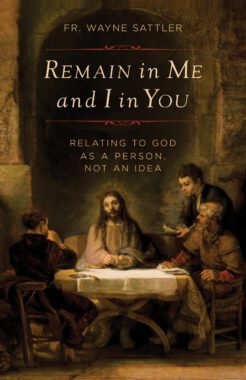A Reflection from “Remain in Me and I in You” by Fr. Wayne Sattler
Mental Prayer and Hearing the Word of God
Meditation is also referred to as mental prayer. Mental prayer, St. Teresa of Avila writes, “is nothing else than a close sharing between friends; it means taking time frequently to be alone with Him who we know loves us.”
To know God more distinctly as the person He is, we will need to learn to waste time with God. Of course, the time is not wasted, any more than we would consider it wasted time for a mother to spend all day with her infant. A mother will come to know that little person in a way others will not, because of the amount of time she spends with her infant. When the baby cries, the mother comes to know whether it is a cry of hunger, weariness, or general fussiness. To those who have not spent that kind of time with this infant, the cries can all sound the same. In fact, the cry of this infant might not be distinguishable from the cry of any other infant. A mother knows the cry of her child and from all the time spent together alone with them, she will know what that little person is communicating with each particular cry.
To know God as the person He really is, it requires being alone with Him frequently. Without actual time spent with God, there is a danger that we will never come to know Him as His own person. We might imagine we know what God is thinking, rather than coming to learn over time the subtleties with which He communicates with us. We may presume that God is much angrier than He is, or we could miss how He is grieving over us. We just might utterly fail to grasp His manner of loving us unless we make the effort that is needed to “be still, and know that I am God!” (Ps. 46:11). To truly know God as the person He is takes time.
To better acquaint us with His thoughts, His ways, His emotions, God has made the effort to put down in writing the greatest love letter ever written. In Sacred Scripture we hear His thoughts, which are not our thoughts; His ways, which are not our ways (Isa. 55:8). Sacred Scripture helps to make very clear that God is His own person, He has a mind of His own, a will of His own, emotions of His own. Sacred Scripture is the Word of God.
The time St. Jerome spent with Sacred Scripture led him to the conviction that “ignorance of Scripture is ignorance of Christ.” St. Jerome spent twenty-one years translating the entire Bible into Latin. Originally, he translated it all from the Greek, and then went on to correct the Old Testament against the Hebrew original. There are so many words in the original Hebrew text of the Old Testament and Greek text of the New Testament that could have different meanings in Latin. Imagine the fervor with which he had to spend time in his heart with God in striving to make the proper translation.
For the next thousand years, his Latin Vulgate was the version of the Bible used by everyone in the Western world for their meditation. Vulgate means “in the common tongue.” Latin was the common language throughout Western Europe at that time. Today the complete Bible has been translated into approximately seven hundred languages. The New Testament has been translated into well over 1,500 languages. It is indeed the greatest love letter of all time.
+
This article on Mental Prayer and Hearing the Word of God is adapted from the book Remain in Me and I in You by Fr. Wayne Sattler which is available from Sophia Institute Press.
Art for this post on a reflection from Remain in Me and I in You on mental prayer: cover used with permission; Photo used in accordance with Fair Use practices.






